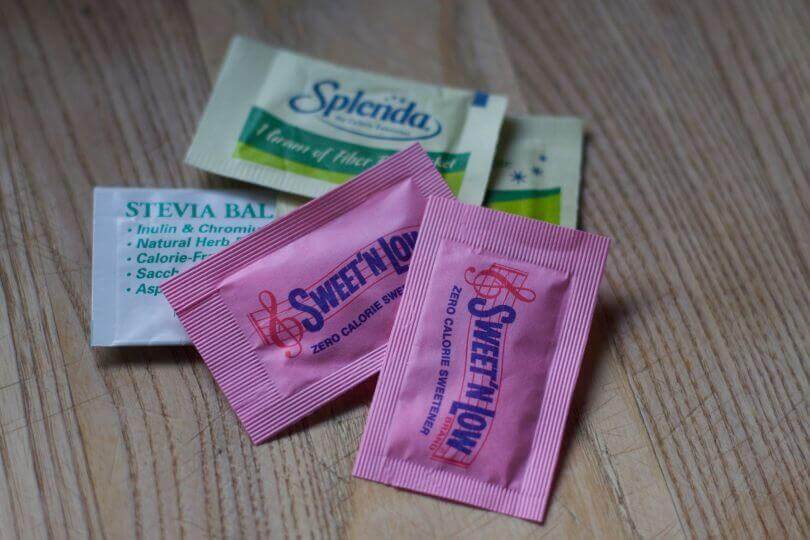If you’re looking to reduce your calorie intake, but not compromise on taste, artificial sweeteners are often the go-to solution. You may think that options for artificial sweeteners over sugar are the healthier option. Yet, these sugar alternatives could be doing more harm than good. In fact, per a recent study, sucralose, sold under the brand name Splenda, may be causing cancer and DNA damage.
Is Sucralose/Splenda Damaging Your DNA?
Splenda is found in many products, including baked goods, beverages, chewing gum, gelatins, and frozen desserts. 600 times sweeter than sugar, Splenda is the best-selling artificial sweetener in America. It’s even found in drug products like Tylenol, Pepcid, and cold and flu medicines.
With growing interest in how sugar alternatives impact human health, researchers from North Carolina State University and the University of North Carolina at Chapel Hill examined how sucralose can harm human cells.
The researchers note that certain gut bacteria can transform sucralose into a similar molecule called sucralose-6-acetate. Sucralose-6-acetate is also found in small amounts in some commercial sucralose products, as it is a byproduct of the manufacturing process.
For the study, the team exposed human blood cells to sucralose-6-acetate in several in vitro experiments.
What does sucralose/splenda do to the body?
According to the findings of the study, published in the Journal of Toxicology and Environmental Health, sucralose-6-acetate showed signs of genotoxicity as it may harm genetic information within cells. In addition to its impact on DNA, the findings also revealed that sucralose-6-acetate caused damage to the gut lining (leaky gut), which can increase the risk for celiac disease, Crohn’s disease, and irritable bowel syndrome.
Also, the findings revealed that sucralose-6-acetate caused an increase in gene activity linked to oxidative stress, inflammation, and cancer.
“These findings raise health and safety concerns regarding the continued presence of sucralose in the food supply and indicate that a regulatory status review needs to be undertaken.” (Schiffman, 2023)
Splenda responds
In response to the study, a spokeswoman for Heartland Food Products, the owner of Splenda, emailed The Post,
“Splenda sucralose products are rigorously tested for impurities, including sucralose-6-acetate, and all ongoing testing confirms sucralose-6-acetate is not present in Splenda brand sucralose products.”
Additionally, a representative for the International Sweetener Association told Newsweek that sucralose had undergone one of the most extensive and thorough testing programs conducted on any food additive in history.
As such, this resulted in consensus on its safety throughout the global scientific and regulatory community. They added that the levels of sucralose-6-acetate in sucralose products are “tightly controlled by robust manufacturing processes.”
Should we ban Splenda?
No, not yet.
While the results are a cause for concern, the study failed to explain how sucralose could affect health on a broader scale. Additionally, the study was an in-vitro study, so more studies within the human body are needed.
Speaking to Medical News Today, Dr. John Damianos, a hospital resident at Yale School of Medicine, not involved in the research, pointed out how “the paper studied sucralose-6-acetate in isolation.”
“While this compound is an intermediate of sucralose (comprising up to 0.67% of sucralose) and metabolite, it does not make up the majority of ingested sucralose, and it is uncertain how much is produced in the human intestine,” he noted.
Are artificial sweeteners safe?
The latest study adds to the list of research highlighting the potential dangers of artificial sweeteners.
- In 2020, a study from Yale published in Cell Metabolism found that sucralose may disrupt one’s blood sugar, leaving them with high blood sugar.
- Then there was a French study published last year that linked the consumption of sucralose with a higher risk of cardiovascular disease, stroke, and coronary heart disease.
- More recently, the World Health Organization warned against using artificial sweeteners, claiming that they do very little for weight loss and that they may affect your longevity.
Using healthier sugar substitutes
If you’re looking for healthier sugar alternatives, there are a few options.
“Date sugar and Yacon syrup are unique sugar alternatives that have a lower glycemic index than sugar, may provide health benefits, and make for great baking.” says Dr. John Damianos.
Dr. Damianos says that while coconut sugar, molasses, honey, maple syrup, and agave are commonly used, they can still raise blood sugar. As such, they should be used sparingly. Rather, he advises that you consider the totality of the diet, with particular attention to increasing dietary fiber and healthy fats, which blunt the insulin spike.
Dr. Damianos concludes by recommending that instead of opting for diet soda, people should switch to seltzer water. Also, instead of processed foods and drinks, “grab fruits with their natural sugars paired with an abundance of health-promoting fiber and phytonutrients.”
Want to know more?
The topic of artificial sweeteners can be complex and controversial. There have even been concerns about aspartame, an artificial sweetener, growing. In fact, recent reports confirm that the World Health Organization is considering declaring aspartame a carcinogenic substance.
MAIN IMAGE CREDIT; Photo by form PxHere
References
Dalenberg, J. R., Patel, B. P., Denis, R., Veldhuizen, M. G., et. (2020). Short-Term Consumption of Sucralose with, but Not without, Carbohydrate Impairs Neural and Metabolic Sensitivity to Sugar in Humans. Cell metabolism, 31(3), 493–502.e7. https://doi.org/10.1016/j.cmet.2020.01.014
Debras C, Chazelas E, Sellem L, Porcher R, Druesne-Pecollo N, Esseddik Y et al. Artificial sweeteners and risk of cardiovascular diseases: results from the prospective NutriNet-Santé cohort BMJ 2022; 378 :e071204 doi:10.1136/bmj-2022-071204
Schiffman, S., Scholl, E., Furey, T. & Nagle, H.T. (2023) Toxicological and pharmacokinetic properties of sucralose-6-acetate and its parent sucralose: in vitro screening assays, Journal of Toxicology and Environmental Health, Part B, DOI: 10.1080/10937404.2023.2213903





![women [longevity live]](https://longevitylive.com/wp-content/uploads/2020/01/photo-of-women-walking-down-the-street-1116984-100x100.jpg)









